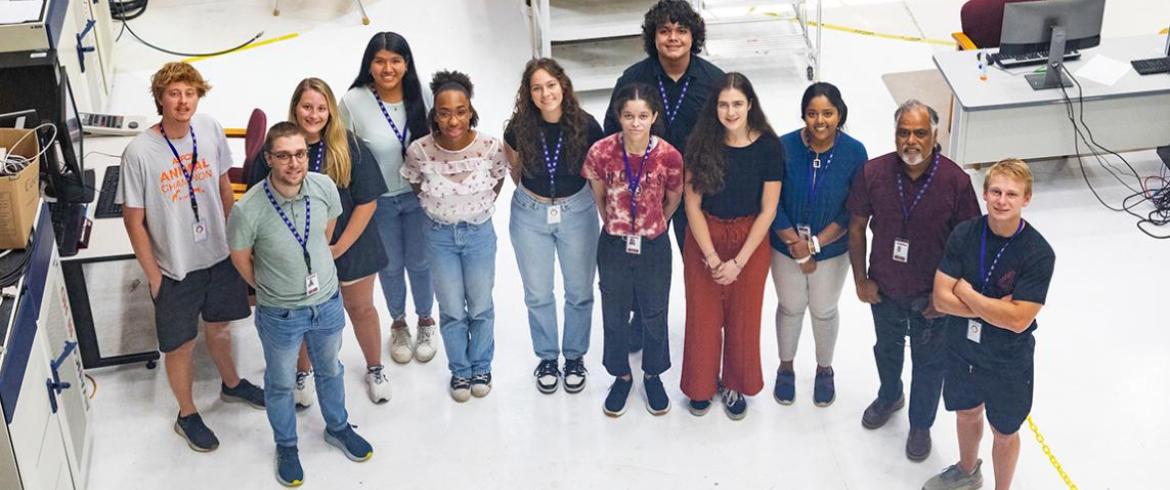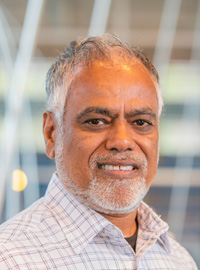
Investing in future researchers: Dr. Ayyalusamy Ramamoorthy’s team (L-R): Matthew Bourque; Sam McCalpin, Ph.D.; Madison Gilmore; Maria Atunca; Layla Frazier; Brianna McVay; Taylor Kinsey; Izaac Canales; Dana Wolfe; Jhinuk Saha, Ph.D.; Prof. Ayyalusamy Ramamoorthy; and Payne Peterson at the National High Magnetic Field Laboratory (MagLab) in Tallahassee, Florida on July 26, 2024. (Scott Holstein/FAMU-FSU College of Engineering)
Ayyalusamy (Rams) Ramamoorthy, a chemical and biomedical professor at the FAMU-FSU College of Engineering and National High Magnetic Field Laboratory (NHMFL), had established a reputation for taking undergraduates under his wing while at the University of Michigan in Ann Arbor. Now, the professor is bringing that tradition to his labs at NHMFL and the joint college.
“I want everybody to have the opportunity to get educated,” Ramamoorthy said. “In higher education, there are barriers for beginners, and I want to remove those barriers, especially for freshman and sophomore undergraduates.”
One way he does that is to involve them in cutting-edge research and help them understand the concepts and master the nuts and bolts of the discovery process.
One of Ramamoorthy’s postdoctoral associates, Sam McCalpin, remembers when he was an undergrad: “I had to figure everything out myself. There weren’t any graduates or postdocs to help. I had a lot of anxiety, and I don’t want our undergrads to have that same sort of uncertainty.”
McCalpin, who mentors some undergraduate students in Ramamoorthy’s group, explained, “There is a balancing act with these students. We guide them, but we also want them to become independent. A well-trained undergraduate student can be as effective as a graduate student in contributing to our research.”
Building Research Skills
Students like Layla Frazier and Payne Peterson, who are involved in Ramamoorthy’s group, showcase the depth of impact the undergraduate research experience has on them as they begin their university journey.

Frazier plans to go into biomedical engineering and currently works with NIH 3T3 cells. She is studying brain cell toxicity and regeneration related to Alzheimer’s and Parkinson’s disease. Peterson is majoring in chemical engineering and working with a group to target a drug delivery system involving solid lipid nanoparticles.
“I love working outside the classroom and getting hands-on experience in the lab,” Peterson shared. “Eventually I want to work in the field of clean energy. It’s important to me to do something I feel is moral and right.”
Ramamoorthy sees beyond the normal inexperience and looks for students with drive and the desire to learn.
“Most of these students have no research experience but their bright, young minds want to be challenged and that’s a great thing,” Ramamoorthy said. “Once they are trained you challenge them with exciting biomedically-important questions. They can also carry out the challenging tasks essential in the discovery process.”
Madison Gilmore is a fifth-year biomedical engineering and pre-medical student working with CYP 450, studying the enzyme’s role involving drug metabolism. After graduating, she plans to go to medical school.
“Diseases like Parkinson’s and Huntington’s are hard to treat and there aren’t many medications out there,” Gilmore said. “The more we understand and expand our knowledge, the more we can improve. I love the research process and am excited about making a difference.”
Motivations for Research
For some undergrad researchers, the motivations are deeply personal. For biomedical engineering students Dana Wolfe and Izaac Canales, their respective research into Alzheimer’s disease and Diabetes is driven by personal connections to these conditions.
“My grandparents suffer from Alzheimer’s disease so I’m working in an application that is super important in my life,” Wolfe said. “There are lots of doctors and nurses in my family, but I will be the first engineer and will be taking a different journey in the way I help people with these diseases.”
Ramamoorthy’s work in diabetes hits home for Canales.
My dad has diabetes, and the disease runs in my family,” he said. “So I am hoping to advance the field in some meaningful way and we can eventually come up with a more effective treatment rather than insulin injections or therapeutics.”
“My parents, who grew up in Nicaragua, had far fewer opportunities than I have had while growing up,” Canales shared. “I want to be the first doctor and the first engineer in my family. This experience will help me achieve my overall goal of helping people and making the world a better place.”
McCalpin knows the value of enthusiastic researchers, even if they are new to the work.
“Everyone benefits when it comes to undergraduate research. We get the extra help we need to carry out our research. The post-doc and graduate students gain experience mentoring and leading a team in the workplace, and the undergraduates learn skills, troubleshoot problems and drive a research objective independently.” – Sam McCalpin, post-doctoral researcher in the Ramamoorthy Lab
“Everyone benefits when it comes to undergraduate research,” McCalpin said. “We get the extra help we need to carry out our research. The post-doc and graduate students gain experience mentoring and leading a team in the workplace, and the undergraduates learn skills, troubleshoot problems and drive a research objective independently.”
As part of the education and training, each undergraduate student on the Ramamoorthy team presents a published research paper and shares their progress in research once a month. All of them participate in the two weekly group meetings: one focused on literature discussion and presentations by group members, and the second focused on learning NMR spectroscopy through chalk talks and discussion with Ramamoorthy. Undergraduate students will also be co-authoring the publications of results from projects they are involved in the lab.
Funding support for the research and stipends is from the National Institute of Health, National Institute of General Medical Sciences, National Institute of Diabetes and Digestive and Kidney Diseases, National Institutes on Aging and the FAMU-FSU College of Engineering.
A Culture of Mentorship
The Ramamoorthy Group includes Jhinuk Saha, a postdoc mentoring several students: Izaac Canales, Dana Wolfe, Layla Frazier, Audrey Wolszczak, and Brianna McVay. Pradeepraj Durairaj, a postdoc, mentors Madison Gilmore and Maria Atuncar. Sam McCalpin, a postdoc, mentors Payne Peterson, Taylor Kinsey and Matthew Bourque.
Other undergraduate researchers, Joshua Dindinger and Kylie Wasisco, will continue their research after the summer break. Two other postdocs, Malitha Widanage and Kiran, biomedical graduate student, Nazifa Ahmad, and high school student Sarayu Vanga also participate in the multidisciplinary biomedical research projects that employ cutting-edge biophysical and biochemical techniques in the Ramamoorthy lab.
RELATED ARTICLES
Grit and determination were key for Diatech Diabetes engineering alumni entrepreneurs
Engineering Student Lands FSU IDEA Grant for Novel 3-D Chip Tech to Fight Cardiovascular Disease
Nole Engineer Alumna Tapped for Department Chair at UF
